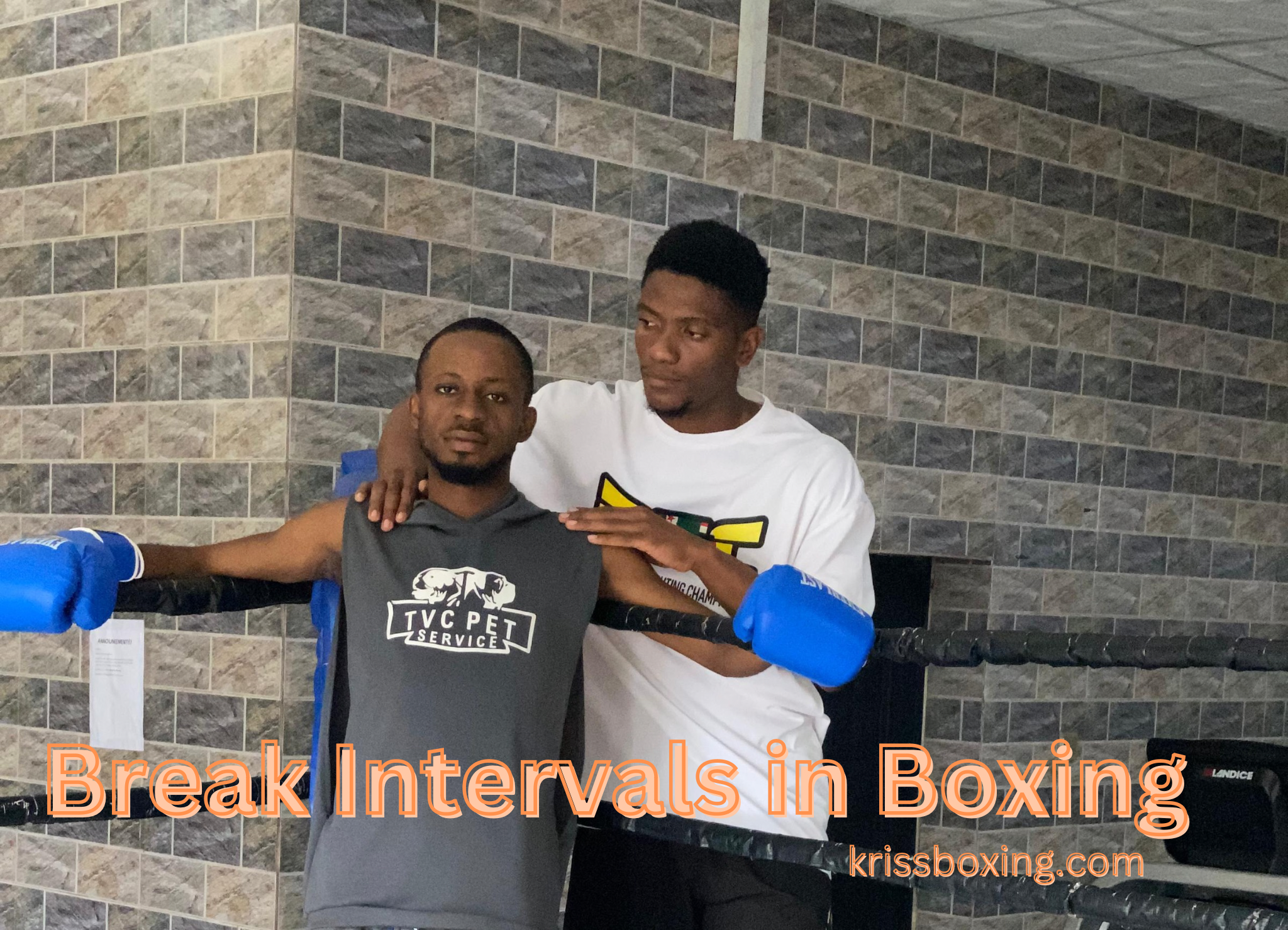Endurance is an important aspect of boxing especially when the fighter is engaged in an intense sparring.
Boxers are required to be energetic and focused for maximum effectiveness throughout the rounds. While working on endurance one is usually more focused on training periods than on rest intervals which are no less important in fact.
The efficient use of breaks is one of the keys to improved stamina and speed of recovery for the boxer and his or her performance.
This article examines the concept of break intervals, the best ways to employ them, and recommendations for enhancing their use during sparring.
The Significance of Time Intervals in Sparring
Resting periods refer to short periods of rest that are taken in between rounds or series of intensive training.
Such gaps in boxing are one minute in length so that the fighters can rest, intake some water, and get advice from their coaches.
These intervals are traditionally used to allow the body and mind to get a break; however, when used tactfully they will enhance endurance dramatically.
Key Benefits of Break Intervals
- Physical Recovery: Using break intervals helps the muscles to rest from the physical activity involved in sparring hence helping to prevent fatigue and injuries.
- Mental Reset: It provides an opportunity for the fighters to relax and prepare mentally as well as to re-strategize depending on their performance in the previous round.
- Hydration and Nutrition: In between rounds, a fighter can drink water and foods that have a low glycemic index to replace the energy used up in the fight.
- Coaching and Strategy: Coaches use break intervals as a chance to correct the strategies, give advice, and encourage their fighters.
The Principles of Implementing Break Intervals
- Timing: The breaks should still be of high frequency and well-timed to allow the muscles to rest while still maintaining the motion.
- Active Recovery: Replacement or an appropriate amount of activity that consists of taking a walk, or gentle stretching during a break to enhance the flow of blood to avoid strains in the muscles.
- Mental Focus: Rest periods must be employed to clear one’s mind, to see the next round, and thus remain alert.
- Hydration and Nutrition: Ensure fast and efficient ways of restoring energy sources early on in the proper hydration and feeding pattern.
Implementing Break Intervals Effectively
Here are some essential strategies and tips:
Pre-Sparring Preparation
- Warm-Up Routine: It should also be remembered that before engaging in sparring, the body should first be loosened up to prepare for a bout. This should involve movements such as stretching exercises, light punch imitation, and light cardiovascular exercises.
- Hydration and Nutrition: Hydrated and have a balanced meal or snack before a spar session to boost your energy levels right from the spar.
During Sparring
- Consistent Breaks: Practice regular breaks, depending on the type of martial art practiced, it is mostly a one-minute break between the three minutes of practice.
- Active Recovery Techniques: During breaks and before attempting to rest, one should do lightweight exercises like walking, stretching, or deep breathing. These activities assist in keeping the blood in circulation and prevent the muscles from hardening up.
- Hydration and Nutrition: Take water or a sports drink to replace the fluids and the loss of electrolytes. The third option is applicable for the Willpower so intake of a fast digesting carbohydrate in the form of a banana or an energy gel will provide an energy pick-me-up during the third hour.
Post-Sparring Recovery
- Cool-Down Routine: Finally, perform cool-down exercises which are essential when coming off the fighting ring static stretching and light aerobic exercises will assist the body to recover from the intense fight and reduce the incidences of getting injured.
- Hydration and Nutrition: It is also recommended to drink water and have a balanced meal/snack with proteins, carbohydrates; and fats for muscle recovery as well as to replenish energy.
Tips for Maximizing Break Intervals
To get the most out of break intervals, consider incorporating these tips into your training routine:
Optimize Hydration and Nutrition
- Pre-Sparring Hydration: It is recommended that before sparings one should always take water to avoid instances of dryness. Also, minimize the consumption of products containing caffeine and alcohol, because they are diuretics.
- Intra-Sparring Hydration: This may include the use of the breaks to take water or any sports drink. This means that it is good to steer clear from sugary products such as energy drinks that result in the giving out of energy.
- Quick-Digesting Nutrients: Make quick-digesting carbohydrates and limited amounts of protein during breaks to keep up the energy and help repair muscles.
Mental Focus and Strategy
- Visualization: Timing should be utilized in such a way that your coaches illustrate to your team the next round picturing some details of it and some techniques or plans that you wish to adopt.
- Positive Self-Talk: Praise yourself and keep saying good things about yourself to motivate yourself. Recall and rehearse your accomplishments and send yourself a set of reminders that you had made before the sparring session all in a bid to fully prepare yourself for the session.
- Coach’s Feedback: I speak to my coach and follow everything that they are saying to me in the letter. It may be useful to continue the battle but use the time obtained in a break to make adjustments based on their intelligence.
Physical Recovery
- Active Recovery: Stand up and move around during breaks or engage in simple activities like walking or stretching during working breaks to ensure that the muscles are relaxed.
- Breathing Exercises: Calm your mind by doing some breathing exercises that will also help in reducing stress and supplying muscles with oxygen.
- Injury Prevention: Ensure that you observe any symptoms of fussiness or any physical harm. Intermittent education can also be used to discuss minor problems and to avert their snowballing into major ones.
Frequently Asked Question
Why are break intervals important in sparring?
It is very important to regulate the pace of the fight so that the muscles can rest, the blood can circulate, hydration helps to cool down and the fighter receives instructions from the corner. They assist in the case of tiredness and improve the efficiency of working.
How can I make the most of my break intervals during sparring?
To optimize the break intervals and actively rest, hydrate, and get nutrition with easily digestible drinks, use positive affirmations and visualization, and listen to your trainers’ insights.
What should I eat and drink during break intervals?
It is recommended to spend break intervals drinking water or a sports drink to replenish the fluids and electrolytes. It can be recommended to use the quickly digestible carbohydrates as a banana or energy gel and exclusively small portions of proteins for maintaining the necessary energy supply and muscle building.
How long should break intervals be in sparring?
Rests in between spar sessions are usually for one minute to three minutes of a spar session. The above duration is enough for effective recovery and still keeps the session’s intensity and momentum in sparring.
Can break intervals help prevent injuries?
Yes, breaks can be effective in preventing injuries since muscles can be given time to rest to help minimize and eliminate fatigue and also treat pains that are otherwise likely to worsen. Recovery, proper water intake, and body awareness during breaks are important when it comes to avoiding injuries.
Conclusion
Applying the principle of break intervals can also be crucial in determining how long one can spar without experiencing the effects of fatigue.
By paying attention to the right timing of the right breaks, hydration, nutrition, and concentration, one can achieve better performance and reduce fatigue in the long run.
Do not forget, that break intervals are not a mere pause, it is the time when the body and mind prepare for the next round. Utilize them effectively to have an upper hand and take your sparring session to another level.


